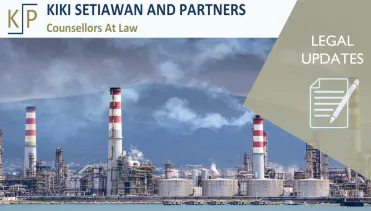
KSP LEGAL UPDATES
Publication
KSP LEGAL UPDATES
The Investigation Authority on Criminal Acts in the Financial Services Sector (Kewenangan Penyidikan Tindak Pidana di Sektor Jasa Keuangan)


Kiki Setiawan & Partners Law Office provides legal consultancy related to Corporate & Commercial legal matters, please call us at
+62 21 2963 8070 or drop us an email at mail@ksplaw.co.id.
The emergence of Law Number 4 Year 2023 on Pengembangan dan Penguatan Sektor Keuangan (P2SK Law) has become a new milestone in regulation reformation in Indonesian financial services sector. Prepared with the omnibus law method, this regulation amended dozens of financial sector related regulations. The law maker hopes that P2SK Law will be able to execute its mandate in strengthening the authority in financial sector, strengthening the supervision on the industry (especially consumer’s protection), accommodate the use of technology in financial sector regulation, etc.
Law Number 21 Year 2011 on Financial Services Authority (OJK Law) is also among the regulations that are amended in P2SK Law. This is due to the strengthening of the authority in the financial services sector. As a follow-up to the issuance of the P2SK Law, OJK enacted OJK Regulation Number 16 of 2003 concerning Criminal Investigators in the Financial Services Sector (Investigation POJK) to replace POJK Number 22/POJK.01/2015.
One of the important changes that needs to be underlined is the changes regarding the investigation authority on criminal acts in the financial services sector. Before the amendment, OJK Law previously regulated the authority holder of investigation on criminal acts in the financial services sector in Article 49 paragraph (1) that reads:
“In addition to the Investigating Officer of the Indonesian National Police, certain Civil Servants whose scope of duties and responsibilities include supervision of the financial services sector within OJK, are given special authority as investigators as referred to in the Criminal Procedure Code.”
Then, P2SK Law has fully changed such Article 49 that the authority holder is now stipulated in Article 49 paragraph (5) that reads:
“The investigation on criminal acts in the financial services sector shall only be conducted by investigators of the financial Services Authority (OJK).”
However, the provisions of Article 49 paragraph (5) have been subject to a judicial review by the Constitutional Court, which decided through Constitutional Court Decision Number 59/PUU-XX/2023 that "Declares that Article 49 paragraph 5 of the Law on the Development and Strengthening of the Financial Sector (PPSK) is contrary to the 1945 Constitution and does not have legally binding force conditionally, as long as it is not interpreted as 'Investigations of criminal acts in the financial services sector can be carried out by investigators from the Financial Services Authority'.
With the granting of the judicial review, police investigators also have the authority to conduct investigations into criminal acts in the financial services sector as mandated in Article 30 paragraph (4) of the 1945 Constitution.
Referring to the provisions of Article 49 paragraph (7) of the P2SK Law, OJK Investigators are given the authority to conduct investigations into Money Laundering Crimes (TPPU) as long as they are in the form of criminal acts in the financial services sector. Furthermore, the Investigation POJK stipulates that OJK Investigators may request information and/or analysis results regarding financial transactions that are indicative of TPPU in the financial services sector from the Financial Transaction Reports and Analysis Center.
Prior to an investigation, OJK will conduct a pre investigation (penyelidikan) into alleged criminal acts in the financial services sector. At the investigation stage, the party suspected of committing a crime in the financial services sector can submit an application to OJK, which contains:
a. the value of the losses incurred and the basis for its calculation;
b. the number of victims who suffered losses and other information related to the victims;
c. the form of settlement of losses and the settlement period;
d. a clause that if the losses are not resolved, OJK has the authority to proceed to the Investigation stage; and
e. efforts to improve business processes and governance.
In assessing the application for settlement of violations and calculating the value of losses due to violations, OJK considers at least:
a. whether or not there is a settlement for losses arising from criminal acts;
b. transaction value and/or value of losses due to violations; and
c. impact on the financial services sector, Financial Services Institutions (LJK), and/or the interests of customers, financiers or investors, and/or the public.
OJK forms an Analysis Team to assist OJK Investigators or can also invite other parties outside OJK to assess requests for settlement of violations and calculate the value of losses due to violations.
OJK investigators may request information from LJK regarding the financial condition of parties suspected of committing or being involved in criminal acts in the financial services sector. LJK is required to fulfill the request of OJK Investigators. LJK that do not fulfill the request of OJK Investigators will be subject to sanctions in accordance with the provisions of laws and regulations, including the Law on Banking, the Law on Islamic Banking, and the Law on Capital Markets.
In addition, OJK Investigators are authorized to block accounts at banks or other financial institutions of any person suspected of committing or being involved in a crime in the financial services sector before and during the investigation stage. Banks or other financial institutions are required to carry out the blocking requested by OJK Investigators. Banks or other financial institutions that do not fulfill the request of OJK Investigators are subject to sanctions in accordance with the provisions of laws and regulations.
Click DOWNLOAD PDF to read the Indonesian version of this Updates
+62 21 2963 8070 or drop us an email at mail@ksplaw.co.id.
The emergence of Law Number 4 Year 2023 on Pengembangan dan Penguatan Sektor Keuangan (P2SK Law) has become a new milestone in regulation reformation in Indonesian financial services sector. Prepared with the omnibus law method, this regulation amended dozens of financial sector related regulations. The law maker hopes that P2SK Law will be able to execute its mandate in strengthening the authority in financial sector, strengthening the supervision on the industry (especially consumer’s protection), accommodate the use of technology in financial sector regulation, etc.
Law Number 21 Year 2011 on Financial Services Authority (OJK Law) is also among the regulations that are amended in P2SK Law. This is due to the strengthening of the authority in the financial services sector. As a follow-up to the issuance of the P2SK Law, OJK enacted OJK Regulation Number 16 of 2003 concerning Criminal Investigators in the Financial Services Sector (Investigation POJK) to replace POJK Number 22/POJK.01/2015.
One of the important changes that needs to be underlined is the changes regarding the investigation authority on criminal acts in the financial services sector. Before the amendment, OJK Law previously regulated the authority holder of investigation on criminal acts in the financial services sector in Article 49 paragraph (1) that reads:
“In addition to the Investigating Officer of the Indonesian National Police, certain Civil Servants whose scope of duties and responsibilities include supervision of the financial services sector within OJK, are given special authority as investigators as referred to in the Criminal Procedure Code.”
Then, P2SK Law has fully changed such Article 49 that the authority holder is now stipulated in Article 49 paragraph (5) that reads:
“The investigation on criminal acts in the financial services sector shall only be conducted by investigators of the financial Services Authority (OJK).”
However, the provisions of Article 49 paragraph (5) have been subject to a judicial review by the Constitutional Court, which decided through Constitutional Court Decision Number 59/PUU-XX/2023 that "Declares that Article 49 paragraph 5 of the Law on the Development and Strengthening of the Financial Sector (PPSK) is contrary to the 1945 Constitution and does not have legally binding force conditionally, as long as it is not interpreted as 'Investigations of criminal acts in the financial services sector can be carried out by investigators from the Financial Services Authority'.
With the granting of the judicial review, police investigators also have the authority to conduct investigations into criminal acts in the financial services sector as mandated in Article 30 paragraph (4) of the 1945 Constitution.
Referring to the provisions of Article 49 paragraph (7) of the P2SK Law, OJK Investigators are given the authority to conduct investigations into Money Laundering Crimes (TPPU) as long as they are in the form of criminal acts in the financial services sector. Furthermore, the Investigation POJK stipulates that OJK Investigators may request information and/or analysis results regarding financial transactions that are indicative of TPPU in the financial services sector from the Financial Transaction Reports and Analysis Center.
Prior to an investigation, OJK will conduct a pre investigation (penyelidikan) into alleged criminal acts in the financial services sector. At the investigation stage, the party suspected of committing a crime in the financial services sector can submit an application to OJK, which contains:
a. the value of the losses incurred and the basis for its calculation;
b. the number of victims who suffered losses and other information related to the victims;
c. the form of settlement of losses and the settlement period;
d. a clause that if the losses are not resolved, OJK has the authority to proceed to the Investigation stage; and
e. efforts to improve business processes and governance.
In assessing the application for settlement of violations and calculating the value of losses due to violations, OJK considers at least:
a. whether or not there is a settlement for losses arising from criminal acts;
b. transaction value and/or value of losses due to violations; and
c. impact on the financial services sector, Financial Services Institutions (LJK), and/or the interests of customers, financiers or investors, and/or the public.
OJK forms an Analysis Team to assist OJK Investigators or can also invite other parties outside OJK to assess requests for settlement of violations and calculate the value of losses due to violations.
OJK investigators may request information from LJK regarding the financial condition of parties suspected of committing or being involved in criminal acts in the financial services sector. LJK is required to fulfill the request of OJK Investigators. LJK that do not fulfill the request of OJK Investigators will be subject to sanctions in accordance with the provisions of laws and regulations, including the Law on Banking, the Law on Islamic Banking, and the Law on Capital Markets.
In addition, OJK Investigators are authorized to block accounts at banks or other financial institutions of any person suspected of committing or being involved in a crime in the financial services sector before and during the investigation stage. Banks or other financial institutions are required to carry out the blocking requested by OJK Investigators. Banks or other financial institutions that do not fulfill the request of OJK Investigators are subject to sanctions in accordance with the provisions of laws and regulations.
Click DOWNLOAD PDF to read the Indonesian version of this Updates

Latest KSP LEGAL UPDATES





